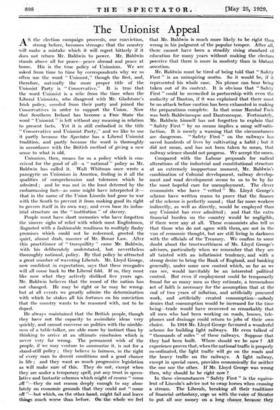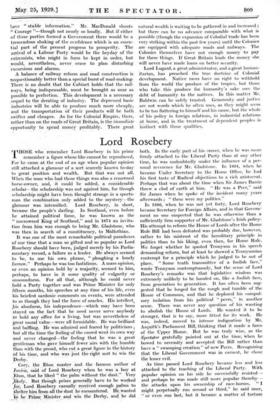The Unionist Appeal
AS the election campaign proceeds, our conviction, strong before, becomes stronger that the country will make a mistake which it will regret bitterly if it does not return Mr. Baldwin to power. Mr. Baldwin stands above all for peace—peace abroad and peace at home. His is the true policy. -of Unionism. • We are asked from time to time by correspondents why we so often use the word " Unionist," though the first, and, therefore, naturally the more proper title of the Unionist Party . is " Conservative." It is true that- the word Unionist is a relic from the • time when • the • Liberal Unionists, who disagreed with Mr. Gladstone's Irish policy, seceded from their party and joined the' Conservatives in order to support the Union. -Now that Southern Ireland has become a Free—State the word " Unionist." is left without any meaning in relation to present facts. Yet it is still embodied in the title " Conservative and Unionist Party," and we like to use it partly because the Spectator has a Liberal Unionist tradition, and partly because the word is thoroughly, in accordance with the British method of giving a new sense to what is Old.
Unionism, then, means for us a policy which is con- ceived for the good of all—a " national " policy as Mr. Baldwin has called it. Walt Whitman once wrote a panegyric on Unionism in America, finding in it all the qualities of comprehension and tolerance which he admired ; and he was not in the least deterred by the embarrassing fact—as some might have interpreted' it— that in the name of the Union Lincoln had gone to war with the South to prevent it from making good its right to govern itself in its own way, and even base its indus- trial structure on the' institution " of slavery.
People must' have short memories who have forgotten the sincere sighs Of relief with which most Englislunen, lisgusted with a fashionable readiness to multiply flashy promises which could not be redeemed, greeted the quiet, almost drab, manner of Mr. Bonar Law. After this practitioner of " tranquillity " came Mr. Baldwin, with his deliberately understated, but nevertheless thoroughly national, policy. By that policy he attracted a great number of wavering Liberals. Mr. Lloyd George, now confident in expectation, says that these renegades will all come back to the Liberal fold. If So, they must like now what they actively disliked five years ago. Mr. Baldwin believes that the mood of the nation has not changed. He may be right or he may be wrong, but at all events we greatly admire the determination With which he stakes all his fortunes on his conviction that the country wants to be reasoned with, not to be doped.
He always maintained that the British people, though they have not the • capacity to assimilate ideas very quickly, and cannot converse on politics with the nimble- ness of a table-talker, are able more by instinct than by thinking to arrive at an ultimate Conclusion which is never very far wrong. The permanent wish of the people, if we may venture to summarize it, is not for a stand-still policy ; they believe in fairriesk, in the right of every man to decent conditions and a good chance in life ; and they want as much progreSSive legislation as will make sure of this. They do not, except when they are under a temporary spell, put any .trust in specu- lative and fantastic schemes which might of Course " come .aff "—they do not reason deeply enough -to say abso- lutely on economic grounds that they could not " come off "—but which, 'on the otherliand, might fail and leave things much worse' than before. Ort..the- whole we feel that Mr. Baldwin is much more likely- to be right than wrong in his'judgment of the popular temper. After all, there cannot have been a steadily rising standard of education for many years without making the electors perceive that there is more in modesty than in blatant assertion.
Mr. Baldwin must be tired of being told that " Safety First " = is an uninspiring motto. So it would be, if it represented his whole case. No phrase can bear being taken out of its context. It is obvious that " Safety First " could be reconciled in partnership with even the audacity of Danton, if it was explained that there must be no attack before caution has been exhausted in making the preparations complete. In that sense Marshal Foch was both Baldwinesque and Dantonesque. Fortunately, Mr. Baldwin himself has not forgotten to explain that " Safety First " by no means implies a smug self-satis- faction. It is merely a warning that the circumstances are dangerous. " Safety First " on the railways has saved hundreds of lives by cultivating a habit ; but it did not mean, and has not been taken to mean, that railway science should not progress. We accept the omen.
Compared with the Labour proposals for radical alterations of the industrial and constitutional structure at an extremely inopportune moment, Mr. Baldwin's combination of Colonial development, railway develop- ment and road development seems to us to be by far the most hopeful cure for unemployment. The clever economists who have " vetted " Mr. Lloyd George's scheme have written reams to prove that the finance of the scheme is perfectly sound ; that far more workers indirectly, as well as directly, would be employed than any Unionist has ever admitted ; and that the extra financial burden on the country would be negligible, if there were any at all. These economists also tell us that those who do not agree with them, arc not in the van of economic thought, but are still living in darkness with the officials of the Treasury. We confess to some doubt about the trustworthiness of Mr. Lloyd George's advisers, particularly when we remember that they are all tainted with an inflationist tendency, and with a strong desire to bring the Bank of England, and banking generally, under some new control which, so far as we can see, would inevitably be an interested political control. But even if employment could be temporarily found for as many men as they estimate, a tremendous act of faith is necessary for the assumption that at the end of two years of inflation, and artificially procured work, and artificially created consumption—nobody denies that consumption would be increased for the time being—trade would have recovered so remarkably that all men who had been working on roads, houses, tele- phones and drainage could return to jobs of their own choice. In 1918 Mr. Lloyd George favoured a wonderful scheme for building light railways. He even talked of " thousands of miles " of these railways. Suppose that they had been built. Where should we be now ? All experience proves that, when the national traffic is properly co-ordinated, the light traffic will go on the roads and the heavy traffic on the railways. A light railway, except in special cases, provides economically for neither the one nor the other. If Mr. Lloyd George was wrong then, why should he be right now ?
In these circumstances " Safety First " is the equiva- lent of Lincoln's advice not to swap horses when crossing a stream. The Liberals, breaking all their traditions of financial orthodoxy, urge us with the voice of Stentor to put all our money on a' long chance because they have " stable information." Mr. MacDonald shouts " Courage "—though not nearly so loudly. But if either of these parties formed a Government there would be a tremendous shaking of the confidence which is an essen- tial part of the present progress to prosperity. The arrival of a Labour Party would be the heyday of the extremists, who might in form be kept in order, but _would, nevertheless, never cease to plan disturbing excursions and alarms.
A balance of railway reform and road construction is unquestionably better than a special burst of road-making. There is no doubt that the Cabinet holds that the rail- ways, being indispensable, must be brought as near as possible to perfection. , This development is a necessary sequel to the derating of industry. The depressed basic industries will be able to produce much more cheaply,- and the transportation Of their products will be both. swifter and cheaper. As for the Colonial Empire, there, rather than on the roads of Great Britain, is the immediate . opportunity to spend money profitably. There great natural wealth is waiting to be gathered in and increased ; -but there can be no advance comparable with what is possible (though the expansion of Colodial trade has been very striking within the past few years) until the Colonies are equipped with adequate roads and railways. The Colonies themselves have not enough money to pay for these things. If Great Britain lends the money she will never have made loans on better security.
Lord Lugard, a great administrator, and a great human- itarian, has preached the true doctrine . of Colonial development. Native races have no right to withhold from the world the produce of the tropics, but those who take. this produce for humanity's sake owe the debt of humanity to the natives. In this matter Mr. Baldwin can be safely trusted. Generosity and justice are not words which he often uses, as they might seem to be too flattering to himself and his cause, but the whole of his policy in foreign relations, in industrial relations at home, and in the treatment of dependent peoples is 'instinct with those qualities.









































 Previous page
Previous page